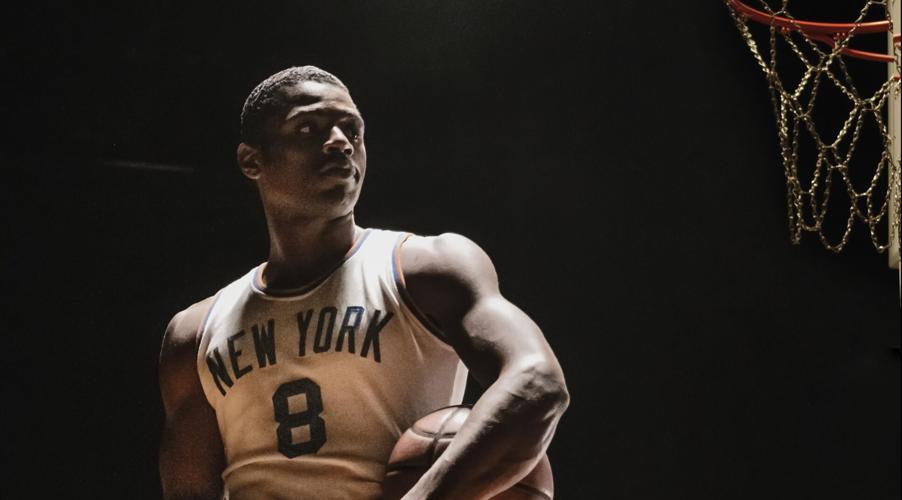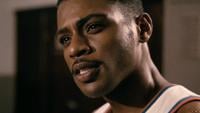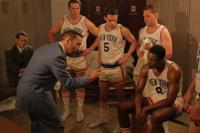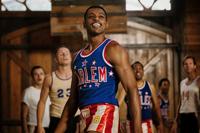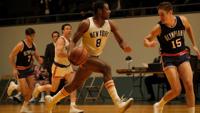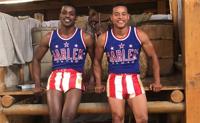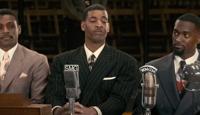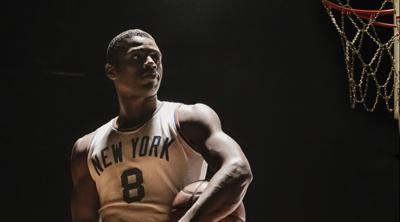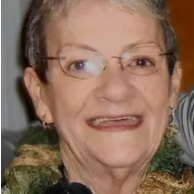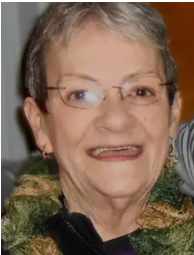It's an interesting counterpoint that this film was released theatrically one week after Ben Affleck's Air (2023). That film and this one, written and directed by Martin Guigui, pronounced GEE-GEE, are both about basketball, but their focus are both on the men who conduct the business behind the sport, making deals often for a lot of money. There are distinct differences between Affleck's film and that of Guigui.
The first difference is that Affleck never depicts any contemporaneous game-play. The only time in Air that one sees any one playing basketball is through archival footage. None of its protagonists or even any of the supporting cast play the sport in the present-day of the narrative. Guigui's film is the opposite. Affleck's film only has people talking about the game. Guigui actually shows people playing, which inherently makes this film more thrilling and exciting. The second and probably most significant difference is this film being about something more than making money, even though making money is a key component.

Everett Osborne (Chicago Fire and Sistas), in his feature debut, stars as Nat Clifton, a World War II veteran who became a professional basketball player. He's African-American and couldn't play in the established professional leagues like the NBA. However, after WWII, racial segregation in major sports began ending, most notably with Jackie Robinson who in 1947 became the first Black person to play professional baseball. Recognizing his incredible talent, men in the NBA wanted to make Nat the equivalent to Jackie Robinson.
After serving in the war, Nat signed a contract with the Harlem Globetrotters, which became the most outstanding all-Black basketball team in the country. The majority of this film depicts Nat as a member of the Globetrotters, as they engaged in barnstorming, which often compared the team to a traveling circus, akin to the Ringling Bros. The film is about the pitfalls of barnstorming for Black athletes or the pitfalls of being on the road and trying to perform in various venues, making this film a kind of companion piece to the recent Oscar-winner, Green Book (2018).

Jeremy Piven (Mr Selfridge and Entourage) co-stars as Joe Lapchick, a professional basketball player in the 1920's and 30's. Like Nat, he played as a barnstormer. Joe became a basketball coach after the Great Depression, eventually landing the job of leader of the New York Knickbockers, aka the "Knicks." After the 1948 Globetrotters-Lakers game, which was an exhibition to see if the best Black team could beat the best White team, Joe decided to try to recruit Nat Clifton who was the obvious standout in that 1948 match.
Piven is charming and genuine in his portrayal. His character is mainly pitted against the NBA owners, but his character being in the offices of the NBA's headquarters don't make much sense. Instead, we're given Ned Irish, played by Cary Elwes (Saw and The Princess Bride). Ned Irish was the founder of the Knicks. His character makes sense as the one to be in those offices and the one to make the financial offers, but Elwes' character is dramatically redundant here to Piven's.

Kevin Pollak (The Usual Suspects and A Few Good Men) plays Abe Saperstein, the founder and coach of the Harlem Globetrotters. His character might be the most intriguing, as he rides the line between hero and villain. He's not an out-and-out racist but he might be complicit to the systemic abuses against Black people. He's a White, Jewish man, who is supportive of his Black athletes. However, at the same time, he is engaging in a kind of exploitation of them. When Nat confronts him on it, it's probably the most verbally compelling scene in the film.
The most visually compelling scenes in the film were the basketball ones. Watching the Harlem Globetrotters do their so-called razzle dazzle was great. The final sequence, which depicts, the opening game of the 1950 NBA season, which broke the color line in that sport, was also incredible. It depicts the challenges and the triumphs of that game, the fouls and the free-throws, the style of Nat Clifton that influenced the game forever. Guigui's direction was absolutely effective.

My only real criticism is that other than Nat Clifton, the film doesn't shine too much of a light on the other Globetrotters. The film name-checks Reece "Goose" Tatum, played by Kevin Daley. It name-checks Marques Haynes, played by Jude Thomas. It name-checks Babe Pressley, played by Herbert "Flight Time" Long. It also name-checks Pop Gates, played by Robert Ri'chard (Chocolate City and Coach Carter).
Daley, Thomas and Long are all real-life basketball players. They're not actors. They're athletes who were hired to be more convincing in the basketball scenes, which is likely why they don't have too many lines of dialogue. The only exception is Ri'chard who is an Emmy-winning actor who has been working in Hollywood for the past 25 years. Yet, he is side-lined and short-changed in ways that feel frustrating. Getting to know his character or any of the other Globetrotters would have been what this film purports to do, which is give voice to these marginalized and unfairly paid group of Black men.

The hook of this film is that it's about Nat Clifton as being the Jackie Robinson of basketball. It is perhaps not as well done as the recent film about Robinson, that of 42 (2013). What undermines this hook is the fact that technically Nat wasn't the Jackie Robinson of basketball. Robinson was the first and lone Black person in the MLB the year he signed. However, the year Nat Clifton signed to the NBA, two other Black men were also signed and in fact, Nat wasn't the first Black person to play in the NBA. He was meant to be, but a scheduling error made him the second, according to this film. In reality, he was the third.
The actual first Black person in the NBA, to break that color line, was Earl Lloyd, played by real-life NBA player Bobby Portis. Chuck Cooper, played by Joshua King Brooks, was the second. Unfortunately, aside from basically being name-checked, both Earl and Chuck are brushed aside. It seems a little disingenuous to hype up Nat Clifton as this Jackie Robinson figure when that's not exactly what he was. His story about breaking the color line is important and his story not being as widely known as Jackie Robinson is endemic of something that I don't think the film explores, but still doesn't diminish his story. Plus, the film is more about pay equity in a way that is still resonant to today's time.

Rated PG-13 for some racial slurs, violence and smoking.
Running Time: 1 hr. and 54 mins.
In theaters.

